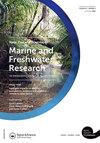对新西兰奥特亚红树林(Mānawa)管理相关感知风险的社会生态评估
IF 1.7
4区 环境科学与生态学
Q3 FISHERIES
New Zealand Journal of Marine and Freshwater Research
Pub Date : 2022-07-03
DOI:10.1080/00288330.2022.2097270
引用次数: 3
摘要
摘要为什么在过去的25年里,新西兰北部海域的红树林及其生态系统一直备受争议?“红树林狂热”的核心是对红树林存在、清除和恢复所带来的风险的多重、相互竞争且往往是对立的看法。毫不奇怪,这导致了红树林知识空间的混乱,在理解红树林管理相关风险所需的知识方面存在重大差距。在对与红树林辩论有关的风险问题进行的社会生态调查中,我们揭示了红树林的局部争议是如何在不同方向上被“仲裁”的。这种状况是由几个关键线索造成的:来自许多来源、压力和意图,但所有这些都涉及公众舆论、科学实践、环境管理程序、毛利知识、社区观点、土地和近海开发以及同意程序等往往不明确的视角。我们系统地研究了这些关键线索的轨迹及其相互作用,这是红树林辩论的基础,也是由此产生的风险描述的可变性。我们的证据表明,红树林扩张和红树林清除影响的感知风险存在争议,并与不同的预期和想象的未来有关。本文章由计算机程序翻译,如有差异,请以英文原文为准。
A socio-ecological appraisal of perceived risks associated with mangrove (Mānawa) management in Aotearoa New Zealand
ABSTRACT Why have mangroves and their ecosystems been so hotly contested over the last quarter century in Aotearoa New Zealand’s northern waters? Central to ‘mangrove mania’ are multiple, competing and often antagonistic perceptions of the perceived risks posed by mangrove presence, their removal and efforts to restore them. Not surprisingly this has led to a chaotic mangrove knowledge space, with significant gaps in knowledge required to understand risks associated with mangrove management. In a socio-ecological investigation of risk questions relating to the mangrove debate, we reveal how localised contestations of mangroves have been ‘arbitrated’ – in different directions. This state of affairs has resulted from several critical threads: from many sources, pressures and intentions, but all involving the often ill-specified lens of public opinion, science practice, environmental management procedures, Māori knowledge, community views, land and inshore development, and consenting processes. We systematically examine the trajectory of these critical threads and their interactions, underlying the mangrove debate and the resulting variability in how risks are portrayed. Our evidence suggests that perceived risk of mangrove expansion, and of mangrove removal impacts, is contested and linked to different desired and imagined futures.
求助全文
通过发布文献求助,成功后即可免费获取论文全文。
去求助
来源期刊
CiteScore
4.50
自引率
12.50%
发文量
35
审稿时长
3 months
期刊介绍:
Aims: The diversity of aquatic environments in the southern continents and oceans is of worldwide interest to researchers and resource managers in research institutions, museums, and other centres. The New Zealand Journal of Marine and Freshwater Research plays an important role in disseminating information on observational, experimental, theoretical and numerical research on the marine, estuarine and freshwater environments of the region.

 求助内容:
求助内容: 应助结果提醒方式:
应助结果提醒方式:


